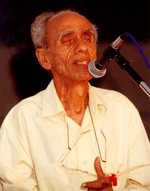Brazil: Ibase, 30 years constructing citizenship
Published on Wed, 2011-08-10 07:49
Source: Ibase The Brazilian Institute of Social and Economic Analysis (Ibase), which is dedicated to strengthening democracy and affirming active citizenship, is one of the focal points of Social Watch in this Latin American country. It celebrated its 30th anniversary on Tuesday this week, and up to the middle of September it will be holding a series of commemorative activities opened by ex-President Luiz Inácio Lula da Silva. The Ibase was created in 1981, and one of the founders was the renowned sociologist Herbert de Souza, better known as Betinho, who died in 1997. In an article on the Institution’s web-site the current Director General, the philosopher and sociologist Cândido Grzybowski, said, “It is a short history for a society but a much longer one for the generation that founded the Institute”. Grzybowski explained that “the idea for the Ibase came to Betinho and his colleagues when they were in exile, and the organization was founded after the amnesty promulgated in 1979 (by the dictatorship ruling Brazil at that time). In fact it is one of many citizens’ organizations that came into being between the dictatorship and democracy. We are a small piece of the recent history of Brazil.” The core principles of the Ibase are liberty, equality, solidarity, participation, diversity and social and environmental justice. It activities are geared to the need to strengthen society’s capacity to form associations, to influence public policies and to create a new culture of fostering citizens’ rights. The Ibase concentrates on acting as a network and as well as its local roots it has connections all over the world, which explains its membership of Social Watch and its collaboration in creating the World Social Forum. Besides this, it has taken part in many campaigns in Brazil including for example the Pact for Citizenship in the favelas (shanty towns) in Rio de Janeiro. Just a few of the milestones in the history of the Ibase mission to renovate and strengthen democracy were the campaign against hunger that was launched by Betinho in the 1990s, the project to promote social balance in enterprises, the Alternex (the first Internet provider in Brazil) and the Dialogues against Racism. The anniversary celebrations began on Tuesday with Lula’s speech in Rio de Janeiro about “Citizenship and politics”, which was broadcast live on the Ibase web-site (http://www.ibase.br) and will be re-broadcast at a later date. This talk by the ex-president of Brazil was the first in a cycle of 10 speeches about “Citizenship and politics” that will finish on 8 September. In addition there will be an exhibition “Betinho and the Ibase” and a festival “Cinema and politics”, that will both run until 18 September. This week on Wednesday and Thursday the Institute will promote a workshop on “Bio-civilization and Sustainability” with representatives from Brazilian and international organizations that belong to the World Social Forum, in preparation for the Río + 20 Conference. Grzybowski went on to say that for the Institute’s founders, many of whom had recently returned to the country after periods of political exile, the creation of Ibase was “…a change in the fight for a great dream of equality and social justice” in a strategy that “…left aside the idea of conquering the State and pursued the vision of constructing a civil and democratic society among ourselves.” Today the Institution is organized into four programme nuclei, which are in charge of directly managing the projects. These are Cities and territories, the Democratization of the State and the economy, Dialogue with the peoples and democratic alternatives to globalization, and Social emancipation and public policies. The Ibase also has six general guidelines or principles that orient the work of all its nuclei and projects: Alternatives to development and the creation of new paradigms, to Combat racism and patriarchalism, Human rights, Communication strategies, Strategies for management and political and financial sustainability, and the World Social Forum. For further information see: The “Ibase-30 years” Programme: http://bit.ly/pqh4a6 “Thirty years of struggle for citizenship”, by Cândido Grzybowski (in Portuguese): http://bit.ly/qytPzQ |
SUSCRIBE TO OUR NEWSLETTER



